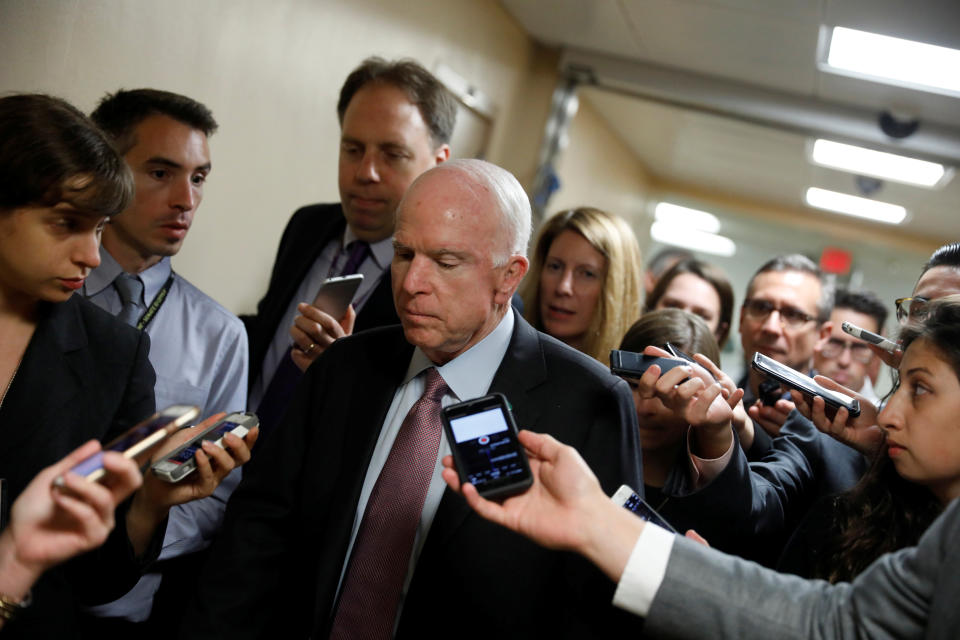All eyes on Murkowski, McCain as Obamacare repeal and replace returns

WASHINGTON — The Senate’s buzzer-beater attempt to repeal and replace Obamacare may come down to two independent-minded Republicans who voted no on the last go-round: Lisa Murkowski and John McCain.
Without support from the GOP holdouts, it is difficult to see how Senate Majority Leader Mitch McConnell, R-Ky., can whip 50 votes for the new health care bill before Sept. 30, the deadline to use the reconciliation process that requires a simple majority to push through the legislation.
The Graham-Cassidy bill would devolve Medicaid and Obamacare subsidy spending to individual states, leading to big cuts for some blue states like Massachusetts while boosting red states that did not expand Medicaid under Obamacare. It also repeals Obamacare’s individual and employer mandates.
Murkowski told reporters Tuesday she was under intense pressure on the bill and would decide whether to back it once she was sure how it affected her home state of Alaska.
“I’m still looking for data that walks me through how Alaska actually does,” she told an NBC reporter. “My governor has said, ‘Hey, I like flexibility, but if I get half as much money, flexibility doesn’t help me.’”
Alaska’s independent governor, Bill Walker, signed a letter Tuesday urging the Senate to drop the Graham-Cassidy bill and come up with a bipartisan solution to health care.
Murkowski added if it’s shown Alaska gets more money and more flexibility, she could “walk” people back home through the plan and sell it.
Meanwhile, Sen. John McCain, R-Ariz., suggested his objections over the process that led to his no vote in July had not been adequately addressed. McCain returned to the Senate in the summer after being diagnosed with an aggressive form of brain cancer and chastised his colleagues for not working together on legislation.
Senate Republicans have scheduled a finance committee hearing on the Graham-Cassidy bill for Monday, which some speculated could swing McCain over to backing the bill. But the Arizonan did not sound impressed.
“You think that that’s regular order?” McCain asked reporters. “I always thought regular order was hearings and debates and amendments and then to the floor with debates, discussion and amendments. That’s what I thought regular order was.”
Sen. Lindsey Graham, R-S.C., a close friend of McCain’s and the author of the bill, says he’ll work the phones over the next few days to try to convince wavering senators to get to yes. President Trump will also apply pressure, he said.
Sen. Rand Paul, R-Ky., has already come out against the bill, dubbing it “Obamacare Lite” because it leaves many of the Affordable Care Act’s taxes in place. Sen. Susan Collins, R-Maine, told reporters she had concerns about the bill’s effect on people with preexisting conditions. If both of them vote no, the GOP conference can’t lose any more senators and still pass the legislation, making the focus on McCain and Murkowski more urgent.

Both Murkowski and McCain are well insulated from political pressures. McCain, a self-styled maverick of the chamber, just won reelection and is also battling a potentially fatal disease. Murkowski’s next election, meanwhile, is more than four years away, and the Alaska senator won her race in 2010 on a write-in campaign as an independent after losing the Republican primary. She owes less to the Republican Party than most other GOP senators.
Alaska Republican Party officials debated censuring her at their committee meeting recently for her vote in July, but ended up rejecting the idea. “The reactions went from condemning her to rebuking her to ‘Let’s start a campaign fund to find a replacement for 2022,’” said Alaska Republican Party Chairman Tuckerman Babcock. “All these things were brought up at our central committee meeting, but all of them were defeated.”
Still, it’s possible Republican leadership could cut a deal with Murkowski that favors her state and gets her to yes, while Graham could prevail upon his friend McCain to come on board.
Getting so close again to a repeal and replace effort is giving some senators a feeling of déjà vu.
“We’re probably within one or two votes, but we’ve been there before,” Sen. Mike Rounds, R-S.D., told Yahoo News.
McConnell, however, is unlikely to bring the bill to the floor unless he has an ironclad 50 votes, not wanting to repeat the public failure of late July when McCain killed the effort with a surprise late-night no vote.
“If we were to go forward we would have to act before September 30,” McConnell told reporters when asked when the bill would be introduced on the floor.
That’s a big if.
Read more from Yahoo News:


